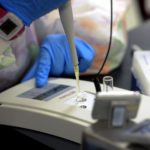Archaeology students study underwater sites possibly at risk from oil spill
Hiding under the surface of the Gulf of Mexico’s waters are numerous fragile historic shipwrecks left behind by the Pensacola area’s previous inhabitants, some hundreds of years ago.
The University of West Florida and the state of Florida have identified 50 underwater sites. UWF archaeologists have investigated about 18 of those, with the most noteworthy being Spanish colonial ships including the two Emanuel Point shipwrecks and the Santa Rosa Island Shipwreck.
“All of these sites relate to Pensacola’s history, its founding, its commercial activities (fishing and lumbering) and its designation as the ‘City of Five Flags,’” said John Bratten, associate professor and chair of the Department of Anthropology, which is part of the Division of Anthropology and Archaeology. “The sites are important to the overall study of nautical archaeology, colonial life and seafaring, shipbuilding, and seafaring traditions. We have an unprecedented nautical archaeology laboratory in our backyard that attracts students to UWF for these same reasons.”
The sites are summer classrooms for maritime students from the UWF Anthropology Department maritime archaeology field school. They also serve as thesis topics for master’s level students as well as lecture topics in a variety of courses.
However, because of April’s oil spill in the Gulf off the coast of Louisiana, the base of fieldwork was moved from Emanuel Point to Blackwater Bay because of the presence of oil in the water. In fact, none of the shipwrecks have been visited since June.
“It was an extreme disappointment to me and to my students that we unable to complete our field season as planned on the site of the Emanuel Point II Shipwreck and a nearby wreck that we refer to as the B-Street Schooner,” said Bratten. “I was relieved to find that my field school students enjoyed participating in the Blackwater River as a fall back area, however. We did some good work up there in last half of summer, identified a new wreck, and selected two more as possible thesis topics.”
He said if bay waters are free of oil and oil dispersants and the water is considered safe by health officials and scientists both on and off campus, the field school will return to Emanuel Point next summer.
If and to what extent the leaked oil may have impacted the shipwreck sites may not be known for some time. Those located closer to the Gulf may be more vulnerable to damage, especially those that serve as an artificial reef to marine life, he said.
The Archaeology Department is seeking funding in order to gauge and monitor any oil-related impact, without which monitoring can only take place during the annual field school.
To learn more about these shipwrecks, visit these sites:
Emanuel Point: http://www.flheritage.com/archaeology/projects/shipwrecks/emanuelpoint
Emanuel Point 11: http://uwf.edu/anthropology/ep2
UWF Anthropology and Archaeology Division: http://uwf.edu/anthropology/research/maritime/emanuel
UWF Documentary: http://www.youtube.com/watch?v=6HnE4c3Q5_M
Santa Rosa Island: http://uwf.edu/shipwreck
By Susie Forrester, University Communications


